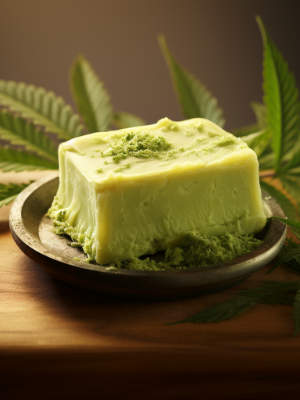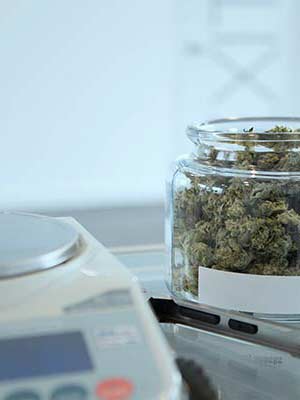Participating in traffic after using Cannabis: everything you need to know
| (Last update at )- New regulations
- What are the consequences of getting caught?
- How long do I have to wait before I can drive again after taking drugs?
- Refuse saliva test and / or blood test
- Launch a counter-investigation
- Manipulate the saliva test or try it yourself at home
- What are the consequences for the accustomed weed user?
- But is there still some hope?
- Current regulations are not good enough
This article was written with the goal of informing you about the regulations, tests and consequences of cannabis use in traffic in The Netherlands. Always use your common sense and never participate in traffic if you've recently consumed alcohol or drugs.
When it comes to alcohol in traffic, every Dutch resident knows that an average person can drink one or two glasses of an alcoholic beverage and may still legally drive a car. When you cross this limit, you risk serious fines and other penalties. But what are the rules regarding weed or hash? And other drugs?
No one can say exactly how long it takes before you can get behind the wheel safely after smoking a joint. There are many different factors, such as weight, metabolism or increased tolerance for regular users.
New regulations
The Dutch government must nonetheless tackle drug use in traffic in one way or another. So as of July 1, 2017 the regulations regarding driving under the influence of drugs have been adjusted. It is important to know that limit values have been established for the presence of certain substances in the blood. In addition, the police can now also use a saliva test in addition to the long-known alcohol test.
Many people wonder whether a saliva test is reliable. Several institutes indicate that there is generally no need to doubt this.
Using the saliva test, the police can quickly see whether traces of drugs can be found in the driver's saliva. If this is the case, the driver must go with the police officer to the police station to give blood samples. The blood test results are of course much more accurate than a saliva test, so this test will assess whether the person in question has used too much drugs to drive a vehicle safely.
The limit values are as follows:
- cannabis: 3.0 micrograms THC per liter of blood;
- amphetamine, methamphetamine, cocaine, MDMA, MDEA and MDA: 50 micrograms per liter of blood;
- heroin and morphine: 20 micrograms per liter of blood;
- GHB, gamma butyrolactone or 1,4-butanediol: 10 milligrams per liter of blood.
Source: Overheid.nl (zoek.officielebekendmakingen.nl)
What are the consequences of getting caught?
The consequences of getting caught with drug use behind the wheel are serious. If the blood test shows that the limit values have been exceeded, the worst case scenario for Dutch residents will be:
- a maximum of 3 months imprisonment or a fine up to € 8,200;
- a report to the CBR (the Dutch DMV) with a one-year driving ban.
The actual sentence depends on the situation. The following matters are taken into account when determining the sentence:
- how much alcohol or drugs the driver has used;
- whether the driver is a novice driver;
- whether the driver has previously been penalized for driving under the influence of alcohol or drugs;
- the type of vehicle the driver is driving;
- whether the driver has caused a traffic accident.
Ultimately it comes down to expecting one or a combination of the following sentences:
- recovery of the driving license;
- a fine;
- community service;
- disqualification from driving for a specific period;
- CBR investigation or measure (e.g. psychiatrist).
How long do I have to wait before I can drive again after taking drugs?
How many micrograms of a certain substance is allowed in your blood is unknown to most of the drug users. In the end, all they really want to know is how long they need to wait before they "officially" can get back behind the wheel.
On 1 July 2017, the NOS (Nederlandse Omroep Stichting) (article is written in Dutch) released a news article about waiting times per type of drugs. Below is a summarized overview of the article:
1. Hash and cannabis
The traceable substance of weed can no longer be detected in the saliva of most people after 6 to 8 hours. Most people should be able to drive again after 3 to 4 hours.
The article doesn’t mention anything about to what extent the amount of used cannabis counts. Especially with regard to cannabis, the use of the term “most people” is very vague, many people wonder how they must interpret this.
2. MDMA
According to the NOS, based on a pill of 171mg, it takes at least 16 hours before you are below the maximum value again. In extreme cases this can even take up to 40 hours. If you take several pills in one evening, it will take even longer before you can drive again.
3. Speed
As with MDMA, it also takes a long time for the drug speed to fall below the maximum, namely about 10 to 20 hours. If you use speed multiple times on one night, you should even take between 26 and 37 hours into account.
4. Cocaine
Cocaine is broken down relatively quickly. You will probably be able to get back behind the wheel after about 4 hours. There is some degree of uncertainty here as well. Because the release of the nasal mucosa can be delayed, it is wiser to wait longer than 4 hours before driving.
5. GHB
When an average person uses GHB, it takes about 8 hours before he or she can get back behind the wheel. If you take more than one dose, it is not known how long it will take before you can drive again. But in any case longer than 8 hours. An addict should therefore never drive a car.
Refuse saliva test and / or blood test
Because checking a driver's saliva is relatively expensive, the police cannot simply test each driver's saliva.
The police may instruct you to cooperate in an investigation if:
- the driver exhibits dangerous driving;
- the officer suspects that the driver is under the influence of drugs;
- a general drugs control is being held.
Of course you can always refuse to cooperate with a drugs test. However, you will be punishable by law and will risk a fine. The police may also take you to the police station for a blood sample to test your blood for drug traces.
You will always be asked for your permission before the blood test is taken. If you refuse, an (assistant) public prosecutor or a competent police officer will give you an order to cooperate. Failure to participate in the blood test is considered a crime, you can then be prosecuted, which will follow in a fine and / or driving disqualification.
Launch a counter-investigation
During the blood test 2 tubes of blood will be taken. The second tube is taken in case you want to start a counter-investigation. You will have to pay for this counter-investigation yourself. If this proves your innocence, the costs can be reimbursed, provided the laboratory meets the requirements.
Manipulate the saliva test or try it yourself at home
There is a lot of speculation online whether it is possible to manipulate or influence the saliva test. How well the saliva test works partly depends on the way the cannabis is being consumed. Traces of cannabis after eating or vaporizing will remain in your saliva for a shorter time than smoking cannabis in combination with tobacco. In addition, it is said that eating fatty foods, for example, can also help. However, so-called experts claim that actually nothing really helps.
Would you like to try the saliva test at home? It seems that the police in The Netherlands are using the Dräger 3000. The test costs about € 40 a piece and is available in Belgium and Germany.
What are the consequences for the accustomed weed user?
Let’s say you use cannabis every day of the week. The values in your blood will stay too high for a long time and it’s safe to say you’ll almost always fail with a blood test. Does that make any sense? Not really... For example, if your last joint was 2 days ago, every user knows that this has absolutely no influence on your driving skills.
The threshold of 3.0 micrograms of THC in the blood is likely to always be exceeded for accustomed cannabis users. This actually means that you can never participate in traffic again. Furthermore, information for citizens is very limited and penalties in relation to crime are extremely high.
But that’s not all. The insurer of your car can also cancel your car insurance as soon as they find out you were under the influence of drugs in traffic. If you caused a fatal accident, the cost will be very high, which effectively amounts to a double penalty.
But is there still some hope?
An article by Advocaat-verkeersstrafrecht.nl [Dutch] discusses a case in which a motorist caused a traffic accident. A blood test revealed that the driver had traces of amphetamine and cannabis in his blood. The court considered the following:
[translated from Dutch] “In addition to an effective amount of amphetamine, the suspect's blood also contained an effective amount of THC. The suspect has stated that he is a accustomed cannabis user. For years he smoked several joints a day. The morning of the accident he had already smoked several joints. The NFI's report, which answers questions from the toxicological study, states that the driving ability of accustomed cannabis users is impaired after recent use of cannabis, but to a lesser extent than non-used users.
A blood concentration at which the driving ability has been impaired by accustomed users cannot be indicated. Research shows that the probability of a car accident due to the combination of cannabis and amphetamine is approximately equal to the sum of the individual probabilities of an accident due to cannabis and amphetamine.
In view of the suspect's frequent use of cannabis for many years, which is not disputed, it is not possible to determine to what extent the concentration of THC found had an influence on the driving behavior of the suspect. Now that the NFI reports do not provide a concrete answer to this, the court cannot deem without reasonable doubt that the suspect should not be considered capable of proper administration due to the concentration of THC found.”
The bottom line is that the NFI (Netherlands Forensic Institute) does not have a clear and concrete picture of the influence of cannabis on the driving behavior of a accustomed user. The court therefore did not consider this as valid proof. The driver still had to go to prison, but this was mainly due to the fact that he or she caused a fatal accident at over 200 km / h. For the full lawsuit, see uitspraken.rechtspraak.nl and linkeddata.overheid.nl (all in Dutch).
Finland is a bit more advanced when it comes to the rules and regulations about cannabis use in traffic. Although the use of cannabis is forbidden in Finland, the court has decided that THC-COOH (the substance which will tell if you have used cannabis in the last few days) does not have any effect on driving behaviour, not even when the levels are high. For more information, see: cannabisenverkeer.nl (in Dutch).
Current regulations are not good enough
On various forums, people react very upset about the new rules in the Netherlands, at least when it comes to the use of marijuana in traffic. This is mainly because the sentences are found to be very excessive and that the regular (medicinal) cannabis user would always fail with the blood test, even if he or she did not use weed for days.
There is also much doubt about the exact effect of cannabis on the driving skills of a driver. Many users will indicate that this is not comparable to alcohol and it is estimated that every user can safely drive a car after 2 or 3 hours. Everything indicates that current legislation on cannabis in traffic is far from perfect. There seems a good chance that the laws will be adjusted / relaxed in the future.
Sources:
- Rijksoverheid.nl: Can I participate in traffic under the influence of drugs?
- Rijksoverheid.nl: What can I do if I disagree with the results of a breath analysis or blood test after driving under the influence of drugs and / or alcohol?
- Overheid.nl: Official Gazette of the Kingdom of the Netherlands
- Advocaat-verkeersstrafrecht.nl: Driving under the influence of alcohol or drugs (art. 8 WVW)
- 3advocaten.nl: New regulations on driving under the influence of drugs
- Teamalert.nl: The saliva test
- Voc-nederland.org: Cannabis and the saliva test 1: the rules and the problems
- Voc-nederland.org: Cannabis and the saliva test 2: protect yourself
- Voc-nederland.org: Cannabis and the saliva test 3: refuse and wild actions
- Nos.nl: This is how long you shouldn't drive after drug use



